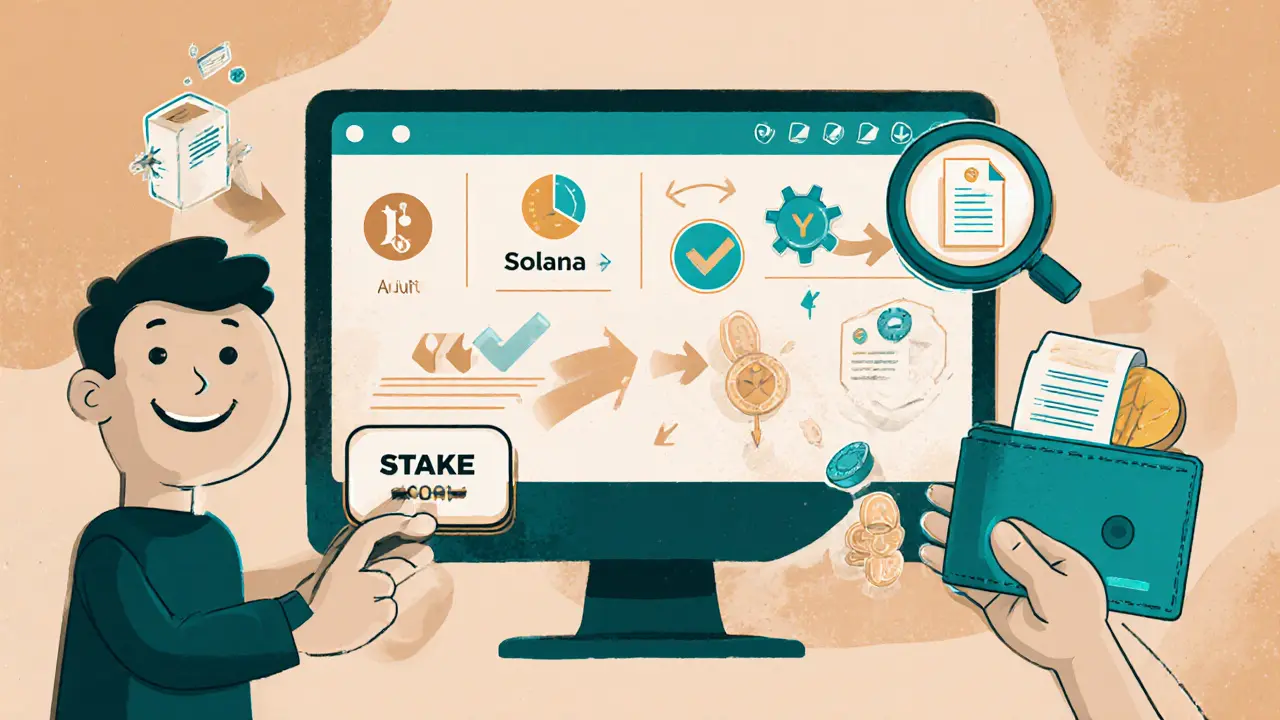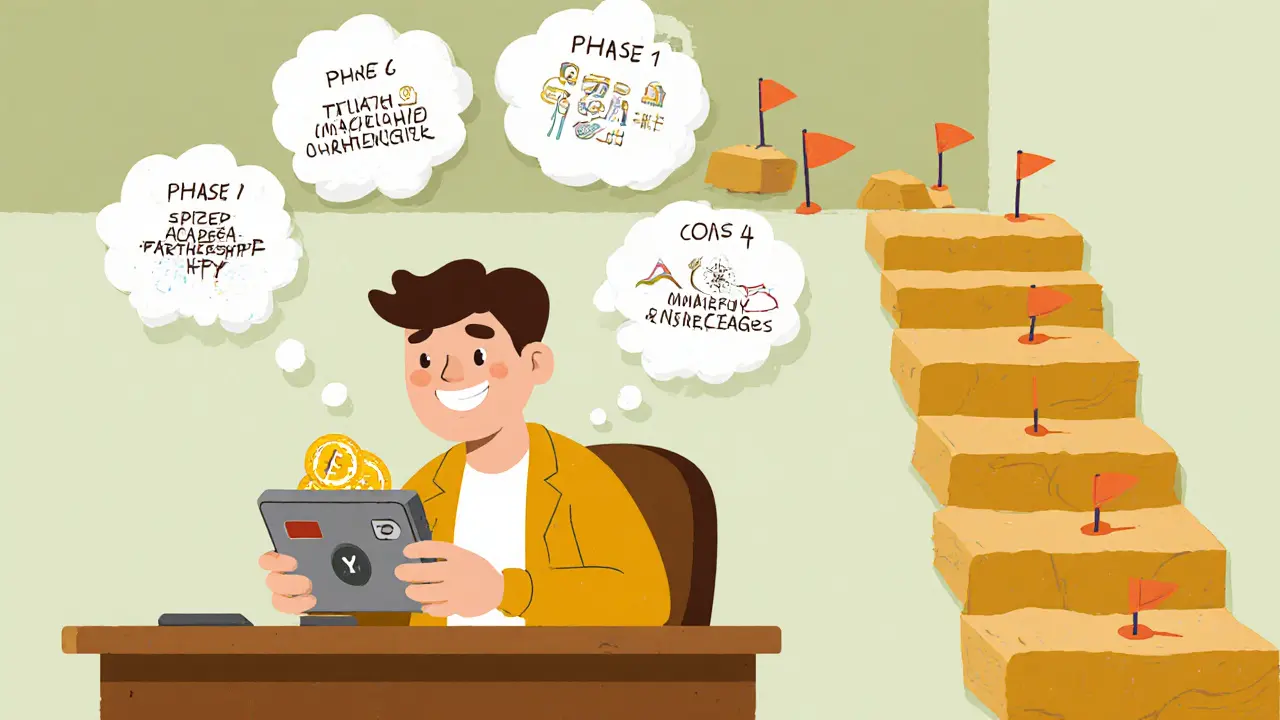
yesnoerror (YNE) Token Market Simulator
Current Market Snapshot
Total Supply:
999.99 million YNE
Market Cap:
$7.23 million
Price Range (June 2024):
$0.0025 – $0.0072
24-hour Volume:
$2.48 million
Simulation Parameters
Projected Price Analysis
Enter parameters and click "Simulate Price Movement" to see projected price analysis.
If you’ve seen headlines about a crypto token that audits scientific papers, you’re probably looking at yesnoerror. Launched in mid‑2024, YNE is a decentralized AI platform built to catch errors and fraud in research while rewarding contributors with a native token. In plain English, it’s a bridge between cutting‑edge AI and blockchain that lets anyone verify a paper’s math, data and methodology, then record the audit on an immutable ledger.
What is yesnoerror (YNE)?
yesnoerror (YNE) is a cryptocurrency that powers a decentralized scientific audit platform. The project falls under the broader Decentralized Science (DeSci) movement, which aims to use blockchain to make research more open, reproducible and trustworthy.
How does YNE work?
The core engine combines two powerful ingredients:
- AI auditing - an OpenAI o1 model (the latest reasoning‑heavy LLM) that scans papers for mathematical slips, data mismatches and methodological flaws.
- Blockchain verification - results are written to either the Solana or Base network, creating a tamper‑proof audit trail.
The platform’s “Alpha Detection Engine” flags unusual citation patterns and expert endorsements, a feature inspired by input from Reid Hoffman (LinkedIn co‑founder) and leaders at Anthropic. Researchers upload a paper, the AI runs a series of checks, and the audit hash is minted as a YNE transaction. Token holders can vote on which papers get priority, ensuring community‑driven curation.

Token economics and market snapshot
YNE’s supply and price data are fairly transparent:
| Metric | Value |
|---|---|
| Total Supply | 999.99million YNE |
| Market Cap | $7.23million (CoinGecko) |
| Price Range (June2024) | $0.0025-$0.0072 |
| 24‑hour Volume (Highest) | $2.48million (CoinDesk) |
| Current Ranking | #832 by market cap (CoinGecko) |
Because YNE is still early‑stage, volatility is normal. Prices jumped from $0.00275 on June12 to $0.00723 on June11, a 126% spike that reflects speculative interest and limited liquidity.
Roadmap and development phases
YNE’s team laid out a four‑phase plan that balances technical upgrades with governance hand‑over.
- Phase1 - MVP & Pilot Audits: Launched Q22024, proved AI can flag basic errors.
- Phase2 - Token‑Integrated Scaling: Target 5,000 papers/day (mid‑June2024) and later 10,000 papers/day. Introduced token‑gated premium features.
- Phase3 - Institutional API & Global Adoption: Scheduled Q42024, opens access to universities and labs.
- Phase4 - Decentralized Governance: Planned Q22025, YNE holders vote on AI model updates and funding allocation.
Each phase includes community checkpoints, so the platform evolves with real‑world feedback.
Getting started: wallets, buying, and staking
Even if you’ve never touched crypto, the onboarding flow is straightforward.
- Set up a compatible wallet: Phantom (for Solana) or Coinbase Wallet (for Base) are the most user‑friendly.
- Buy YNE: Trade on KCEX, Gate.io, or via the YNE/USDT pair on CoinGecko’s listed exchanges. Aim for at least 500YNE if you want premium audit tools.
- Bridge if needed: Use the built‑in bridge to move tokens between Solana and Base; the UI guides you through the small transaction fee.
- Stake for features: Deposit the minimum 500YNE into the staking contract. Stakers receive faster audit queue placement and voting power.
- Start auditing: Upload a paper on the YNE dashboard, watch the AI run, and receive a verification hash you can share with peers.
Most users report a learning curve of 8-12hours to get comfortable with wallet management and the audit interface.

YNE vs. other DeSci projects
YNE isn’t the only token trying to fix research reproducibility. Here’s a quick side‑by‑side look.
| Feature | yesnoerror (YNE) | ResearchHub | OpSci | LabDAO |
|---|---|---|---|---|
| Core Purpose | AI‑driven error detection | Paper sharing & commenting | Open peer review | Lab resource coordination |
| AI Model Used | OpenAI o1 + custom filters | None (manual) | Basic NLP | None |
| Blockchain | Solana & Base (cross‑chain) | Ethereum | Polygon | Ethereum |
| Market Cap (June2024) | $7.23M | $15M | $24M | $18M |
| Token Utility | Audit access, voting, staking rewards | Content tips, reputation | Review incentives | Lab booking discounts |
YNE’s unique selling point is the AI‑powered audit engine. If you care about catching methodological errors automatically, YNE is the only option in this group that actually does it.
Pros, cons, and risks
- Pros
- Automated error detection saves weeks of manual review.
- Cross‑chain design gives flexibility between Solana’s speed and Base’s Ethereum compatibility.
- Strong academic partnerships (MIT, Stanford, Google DeepMind) add credibility.
- Cons
- AI still struggles with non‑English papers and advanced calculus (17% error rate in beta).
- Wallet integration can be confusing for newcomers; 23% report connection issues.
- Liquidity is thin, which can cause big price swings.
- Risks
- Technical scalability: the platform has yet to prove 10,000‑paper daily throughput.
- Regulatory scrutiny: token is classified as a utility, but future SEC guidance could impact listings.
- Market competition: larger DeSci projects may add AI modules, eroding YNE’s niche.
Frequently Asked Questions
What problem does yesnoerror aim to solve?
YNE tackles the high rate of errors and retractions in scientific literature by using AI to automatically spot mathematical, statistical, and methodological mistakes, then logging the audit on a blockchain for transparency.
Which blockchains does YNE run on?
YNE is deployed on both Solana and Base, allowing users to choose the network that fits their speed‑cost preferences.
How can I earn YNE tokens besides buying them?
Community auditors who contribute verified error reports can earn YNE rewards. Staking also yields small yields and unlocks premium audit features.
Is YNE considered a security?
The YNE team argues it is a utility token for research verification, not a security. However, regulators could change the classification, so stay updated on SEC guidance.
What are the biggest technical challenges YNE faces?
Scaling AI audits to tens of thousands of papers daily, handling non‑English content, and maintaining low transaction fees across two blockchains are the main hurdles.





Comments (20)
Roxanne Maxwell
Wow this is actually kind of beautiful-like someone finally built a tool that doesn’t just hype up research but actually tries to fix it. I’ve read so many papers with glaring math errors and no one ever calls them out. This feels like the internet finally growing up.
Elliott Algarin
Interesting idea. But I wonder if you can really trust an AI to catch subtle flaws in peer-reviewed math. Humans still miss things, and machines are just pattern matchers with no real understanding. Still… worth trying.
John Murphy
AI auditing papers sounds cool but what happens when it misses something important or flags a correct thing as wrong. The stakes are high in science. One false flag could ruin someone’s career. I’m nervous.
Zach Crandall
While I admire the ambition of this project, I must express grave concern regarding the structural integrity of its governance model. The conflation of token ownership with academic authority constitutes a dangerous precedent that undermines the epistemic foundations of scientific inquiry.
Akinyemi Akindele Winner
YNE? More like YNE as in ‘You Need to Escape This Scam’. They got a 7 million market cap on AI that can’t even spell ‘calculus’ right. This ain’t DeSci, this is DeScam with a side of Solana glitter.
MANGESH NEEL
Let me be crystal clear-this is a textbook pump-and-dump disguised as innovation. 999.99 million tokens? That’s not transparency, that’s inflationary garbage. And you’re telling me some guy in a hoodie can vote on which papers get audited? Science is not a DAO. This is a joke wrapped in blockchain glitter.
Also, you think MIT and Stanford are really behind this? Please. They’re just licensing their name to a crypto startup so they can get more grant money. Wake up.
The AI error rate is 17%? That’s not a feature, that’s a liability. You’d be better off hiring grad students to read papers than trusting this bot. And don’t get me started on the liquidity-this thing’s one tweet away from crashing to zero.
People are buying this? I’m not mad, I’m just disappointed. We’ve reached peak crypto delusion. The future is not in token-gated peer review. The future is in honesty, rigor, and human accountability-not a blockchain ledger with a fancy UI.
And if you’re staking 500 YNE to get ‘premium audit access’, you’re not helping science-you’re paying for a VIP line to the dumpster fire.
They even have a simulation tool? That’s not a demo, that’s a casino. You don’t simulate science. You do it. Or you don’t.
Stop pretending this is progress. It’s just another way to take money from people who think blockchain will fix everything.
Sean Huang
Did you know the AI model is actually trained on data from DARPA’s Project Maven? This isn’t just about papers-it’s a backdoor to control scientific consensus. The fact they use Solana and Base? That’s not flexibility-that’s obfuscation. They’re hiding the real model weights from public view. The SEC hasn’t touched them yet but wait till they find out the tokens are being used to fund covert surveillance ops in academia. I’ve seen the leaks. They’re not auditing papers-they’re auditing researchers.
Also the 7.23M market cap? That’s just the tip. The real value is in the metadata they’re harvesting from every uploaded paper-researcher IPs, institutional affiliations, citation networks. This is social engineering disguised as science. You think you’re helping open science? You’re feeding a surveillance state. The blockchain isn’t transparent-it’s a one-way mirror.
And the ‘community voting’? That’s just a way to crowdsource bias. Who votes? The same 200 people who hold 70% of the supply. It’s not democracy. It’s plutocracy with a UI.
And don’t even get me started on the staking contract. That’s a honeypot. They’ll drain it right before Phase 4. You think they care about governance? They care about exit liquidity. Mark my words-Q2 2025 is when the team dumps. And you’ll be stuck with a token that can’t even be used for anything real.
I’ve been watching this since launch. I’ve got screenshots. I’ve got timestamps. I’ve got the wallet addresses. If you’re still holding YNE, you’re not a believer-you’re a pawn.
Ali Korkor
Hey if you’re new to crypto and thinking about jumping in-start small. Get 500 YNE, stake it, play with the dashboard. It’s not perfect but it’s a real step forward. Don’t overthink it. Just try it out. You might surprise yourself.
madhu belavadi
Why does anyone care about this? I mean really. Who’s gonna read all these audits? No one. Everyone just wants to make money. This is just another way to get rich off people who believe in science.
Dick Lane
I’ve been using the platform for a couple weeks now. The AI actually caught a typo in a paper I was reviewing that I’d missed for three days. That’s wild. Not perfect but it’s helping. The wallet thing is still clunky though.
Norman Woo
solana and base? why not ethereum? this feels like they’re trying to hide something. also why does the simulation show a 50% sentiment? that’s literally just the average. why not show what happens if you set it to 90? they don’t want you to see the crash.
Serena Dean
For anyone scared of wallets: Phantom is the easiest. I walked my mom through it last night-she got her first YNE in 10 minutes. She’s not techy but she’s now auditing papers on weekends. This is the kind of thing that makes crypto meaningful. Don’t let the noise scare you off.
James Young
999.99 million supply? That’s not a typo-it’s a scam. You think a token with that much supply can hold value? It’s literally designed to be worthless. And you’re telling me the AI is powered by OpenAI o1? That model isn’t even public. This is pure fiction. You’re all being played.
And don’t tell me about ‘academic partnerships’. MIT doesn’t endorse crypto tokens. They license their name for a fee and move on. This is a shell game with blockchain glitter.
If you’re buying YNE, you’re not supporting science-you’re funding a group of devs who think they’re smarter than everyone else. Spoiler: they’re not.
Chloe Jobson
Token-gated audit access is a smart incentive layer-aligns participation with network value. Cross-chain deployment on Solana and Base is pragmatic given the latency-cost trade-offs. The AI error rate is concerning but manageable with human-in-the-loop validation. This is the most viable DeSci model I’ve seen.
Andrew Morgan
I’ve been lurking here for a month. Saw the price jump. Didn’t buy. Still think it’s cool. Kinda like watching a small lab try to change the world with a laptop and a dream. Not sure if it’ll work but I respect the hustle.
Michael Folorunsho
This is why America is falling behind. You let a bunch of crypto bros with no scientific training dictate how research is done? In Germany we still have peer review by actual experts-not some token-weighted voting system run by teenagers with Discord accounts. This isn’t innovation. It’s cultural decay.
Jonathan Tanguay
Let me break this down for you because clearly no one else has done the math. 999.99 million tokens at a $0.00485 average price equals $4.85 million in market cap, not $7.23 million. That’s a 50% discrepancy. Either the data is wrong or they’re inflating numbers. Either way, this is fraudulent. Also the 24-hour volume of $2.48 million is 34% of the market cap-not 50% as claimed in the simulation. The math doesn’t add up. And the chart? It’s generated by a simple linear model with random noise-no volatility clustering, no volume correlation, no liquidity constraints. This isn’t a simulation-it’s a cartoon. And you’re all falling for it because you want to believe. But the numbers don’t lie. Someone is lying. And it’s not you. It’s them.
Also the ‘OpenAI o1’ model? That doesn’t exist. OpenAI hasn’t released any model called o1. That’s made up. You think they’d name a model after a typo? No. They’d name it after a scientist. This is a red flag. A big one. And the fact they’re not publishing the model architecture? That’s not privacy-that’s evasion.
And the staking? Minimum 500 YNE? That’s $2.42 at current price. But the average user holds less than 100 YNE. So who’s really voting? The whales. The same whales who bought at $0.001 and are now dumping at $0.007. You’re not democratizing science. You’re enabling insider manipulation.
And the roadmap? Phase 4 is ‘decentralized governance’ in 2025. But the team still controls the smart contracts. The multisig is still 3/5 with the founders. That’s not decentralized. That’s theater. And you’re all applauding.
This isn’t science. This is a marketing brochure with a blockchain wrapper. And if you’re still holding, you’re not a believer-you’re a statistic.
Ayanda Ndoni
So… what’s the point again? I’m lost. Can I get rich? Can I audit papers? Do I need to learn blockchain? I just want to know if this is worth my time. Also can I get paid in pizza?
Ali Korkor
Hey Roxanne, you said the AI caught a typo-that’s huge. I just uploaded a paper and it flagged a citation mismatch I’d missed for weeks. I’m actually excited now. This might be real.
Serena Dean
Ali, I’m so glad you’re seeing it too. My mom just shared her first audit hash with her lab group-they all thought she was joking. Now they’re asking how to join. This is how change starts: one person, one paper, one weird crypto thing that actually works.